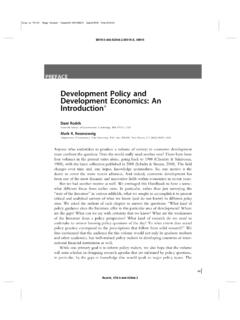Transcription of Lawyers as Professionals and as Citizens ... - Harvard CLP
1 Harvard LAW SCHOOLC enter on the Legal ProfessionLawyers as Professionals and as Citizens :Key Roles and Responsibilities in the 21st CenturyBen W. Heineman, F. LeeDavid B. WilkinsAuthored by Ben W. Heineman, F. Leeand David B. WilkinsPublished by the Center on the Legal Profession at Harvard Law SchoolTABLE OF CONTENTSI. INTRODUCTION5II. THE FRAMEWORK9A. Technical Expert, Wise Counselor, and Effective Leader9B. The Four Ethical Responsibilities11C. Complementary Competencies: Beyond the Core 13 III. THE CONTEXT17A. The Importance of Multinational Companies, Large Law Firms, and Leading Law Schools17B. The Challenges of the Marketplace18IV. THOUGHTS ON CORPORATE LAW DEPARTMENTS22A. Responsibilities Inside the Corporation23 1.
2 Supporting the CEO s creation of an integrity culture23 2. Resolving the partner-guardian tension24 3. Duties to employee lawyer s professional and personal needs25B. Ethical DecisionMaking about Stakeholder Issues26C. Relations With, and Responsibilities To, Law Firms28 1. Young associates28 2. Request for firm views on What is Right 29 3. Promoting diversity in law firms29 4. Improving the justice system30 5. Competition or cooperation: Strategic alliance30 6. Broader outside counsel/supplier guidelines31D. Responsibilities to society: corporate citizenship and public policy32E. Obstacles34V. THOUGHTS ON MAJOR LAW FIRMS36A. The Historic Balance Between Service and Business 36B.
3 The Problems From Over-Emphasis on Short-Term Profits38C. Finding a New Balance: The Role of Firm Leadership in Furthering the Service Dimension of the Legal Profession39 1. Rededication of law firms duties to partners41 2. Young lawyers42 3. Compliance44 4. Rededication of law firm s duties to clients/stakeholders44 5. Rededication of law firm s duties to the legal system46 6. Rededication of law firm s broader duties to society47D. ON LEADING LAW SCHOOLS49A. Preparing Students for Their Ethical Responsibilities as Technicians, Counselors, and Leaders50 1. Teaching directly about Lawyers roles, institutions, and competencies50 2. From the case method to real cases52 3.
4 Between the profession and the professoriate54 4. The third year55 5. The placement process58B. Obligations to the Rule of Law and to the Connection Between Law and Society 59C. Obligations to the Law School61D. Building Consensus While Paying Up Front62 VII. CONCLUSION65A. Collaboration65B. Next Steps66 ABOUT THE AUTHORS About Ben W. Heineman68 About William F. Lee69 About David B. Wilkins70 About Felicia H. Ellsworth71 SELECT BIBLIOGRAPHYi. - .ixI. INTRODUCTIONI. INTRODUCTION This essay presents a practical vision of the responsibilities of Lawyers as both Professionals and as Citizens at the beginning of the 21st century. Specifically, we seek to define and give content to four ethical responsibilities that we believe are of signal importance to Lawyers in their fundamental roles as expert technicians, wise counselors, and effective leaders: responsibilities to their clients and stakeholders; responsibilities to the legal system; responsibilities to their institutions; and responsibilities to society at large.
5 Our fundamental point is that the ethical dimensions of lawyering for this era must be given equal attention to and must be highlighted and integrated with the significant economic, political, and cultural changes affecting major legal institutions and the people and institutions Lawyers serve. We have chosen to write this essay as a joint statement from a former general counsel of a global corporation, a former managing partner of an international law firm, and a professor of the legal profession at a major law school. We therefore focus our discussion on the four ethical duties in the institutions we know best corporate legal departments, large law firms, and leading law schools and on the important connections among them.
6 But we also hope that both the ethical framework we propose and our commitment to a shared responsibility for giving it practical effect will have resonance in the many other important settings in which Lawyers work. The four duties are, we believe, central to what it means to be a lawyer, even as the practical expression of these responsibilities will undoubtedly vary by context and will require new and greater collaboration that reaches across many of the profession s traditional divides. In the pages that follow, we are mindful of the dramatic changes in both the legal profession and in society that make the realization of our or any other ethical vision of lawyering especially difficult today.
7 There is widespread agreement that the legal profession is in a period of stress and transition; its economic models are under duress; the concepts of its professional uniqueness are narrow and outdated; and, as a result, its ethical imperatives are weakened and their sources ill-defined. We are also mindful that some will resist the invitation to review and address the broad array of ethical issues we raise in a time in which so many of the profession s traditional economic assumptions are in question. Nevertheless, we reject the idea that there is an inherent and irresolvable conflict between business and service. To the contrary, we believe that, while tradeoffs about resource allocation will certainly be required, the proper recognition of each of the four ethical duties we explore is ultimately essential to the sustainability of business whether that is the business of companies, law firms, or law schools, or more broadly, the health of our economic and political system as a whole.
8 We therefore hope that this essay will stimulate an integrated discussion among the broad range of actors with a stake in the future of the legal profession not just about the pressing economic issues in major legal institutions but also about the equally pressing concerns relating to ethical responsibilities. The rest of this essay proceeds in six parts. Part II sets out our basic framework. It explicates Lawyers three fundamental roles as expert technicians, wise counselors, and effective leaders. It describes the sources and broad definitions of Lawyers four responsibilities: duties to clients and stakeholders; duties to the legal system; duties to one s own institution; and duties to the broader society.
9 To effectively discharge these responsibilities, it argues that Lawyers must not only have core legal competencies but also complementary competencies 5involving broad vision, knowledge, and organizational skills that, while not unique to Lawyers , are essential to the counseling and leadership roles. This Part thus describes how our framework goes beyond the limits of the bar s formal ethical rules and challenges Lawyers as both Professionals and as Citizens . Part III describes the context for our analysis. While recognizing the profound importance of other entities, we explain that we have chosen leading companies, law firms, and law schools as the focus of our analysis because of their influence in setting norms for Lawyers , their role in providing counselors and leaders across society, and their standing in public perception of the law.
10 It outlines our assumptions about the large-scale forces transforming the economics of these institutions. These include accelerating competition, costs, technology development, and transparency and, in the case of companies and firms, undue focus on short-term profit maximization and profits per partner. All these factors gain greater force from globalization. A final contextual dimension is the cost and paradox of regulation of the legal profession: increasing the cost of becoming a lawyer while reducing the competition from other more effective and efficient providers of legal or legally related services. And, while noting that efforts to discharge the four responsibilities will entail allocation of resources and trade-offs, we maintain that forging a new, contemporary partnership between service and business is essential to the success, sustainability, and durability of these institutions.





